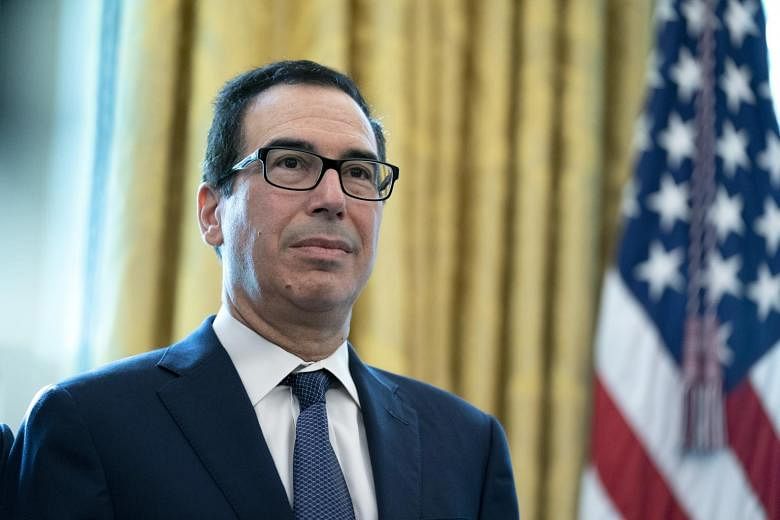WASHINGTON (REUTERS) - US Treasury Secretary Steven Mnuchin said on Thursday (Nov 19) that key pandemic lending programmes at the Federal Reserve would expire on Dec 31, putting the outgoing Trump administration at odds with the central bank and potentially adding stress to the economy as President-elect Joe Biden organises his administration.
In a letter to Fed Chair Jerome Powell, Mr Mnuchin said the US$455 billion (S$611 billion) allocated to Treasury under the Cares Act last spring, much of it set aside to support Fed lending to businesses, nonprofits and local governments, should be instead available for Congress to reallocate.
"I am requesting that the Federal Reserve return the unused funds to the Treasury," Mr Mnuchin said in a letter to Mr Powell, declining to extend programmes the central bank has said were critical to assuring credit flowed to all parts of the economy during the worst economic downturn in a century.
The announcement was not expected by Fed officials, who had said this week that the programmes should be extended, and told Mr Mnuchin so immediately after his decision was made public.
In an emailed statement, the Fed said it "would prefer that the full suite of emergency facilities established during the coronavirus pandemic continue to serve their important role as a backstop for our still-strained and vulnerable economy."
"I think given where the economy is, and there is so much uncertainty still out there, it is prudent to keep those things open," Atlanta Fed President Raphael Bostic said in an interview on Bloomberg Television.
Mr Bostic is on the shortlist to be Mr Biden's Treasury secretary.
The announcement could signal potential trouble for the incoming Biden administration. Although the programmes were not used extensively, Fed officials felt their presence reassured financial markets and investors that credit would remain available to help businesses, local agencies and even nonprofits through the pandemic downturn.
The announcement sent benchmark US Treasury yields and equity index futures lower.
The 10-year Treasury note yield slid 2 basis points and was the lowest in 10 days at 0.83 per cent. S&P 500 index emini futures fell 0.7 per cent after they reopened at 6pm EST (7am Singapore time Friday) for the overnight trading session.
Mr Mnuchin did allow a 90-day extension to a group of other programmes that supply cash to core financial markets, including those for short-term corporate credit.
But Fed officials have emphasised in recent days that the broad economy is not yet out of the woods, with the pandemic spreading, millions unemployed and important business sectors suffering Depression-level downturns.
In his letter to Mr Powell, Mr Mnuchin said that in the "unlikely event" the lending programmes were again needed, the Fed could request the Treasury to re-establish them with funding from the Treasury's own stability fund or with new money from Congress.
The programmes, particularly the "Main Street" and local government landing programmes, raised the prospect of trillions of dollars in central bank credit flooding into an economy that had been partially shut down in the spring because of the pandemic.
As of Thursday, the Fed had made just US$5.4 billion in Main Street loans, according to data released on Thursday. The Municipal Liquidity Facility had only issued about US$1.7 billion in loans.
But the programmes were considered an important element of the pandemic response, broadened at the behest of lawmakers who wanted the central bank's lender-of-last-resort powers, usually limited to financial institutions, opened to the entire economy because of the pandemic's dramatic impact on commerce.
Injecting Uncertainty
Some Republicans in Congress now felt it was time for the Fed to retrench, even with coronavirus infections at record levels and deployment of a vaccine likely months off.
Mr Pat Toomey, a Republican senator poised to lead the Banking Committee, which overseas the Fed, if Republicans hold the Senate, applauded the Treasury's actions.
"These facilities … have successfully achieved their intended purpose," he said. "With liquidity restored, they should expire, as Congress intended and the law requires, by December 31, 2020."
Others were not convinced.
"The Fed has been one of the only sources of stability in Washington and removing its latitude to offer support in a shaky recovery is simply nonsensical," said Mr Isaac Boltansky, director of policy research at Washington-based Compass Point Research & Trading.
"This is a distressing development that injects uncertainty and instability into markets completely unnecessarily. How many times will Washington trip on its shoelaces in response to this crisis?"

